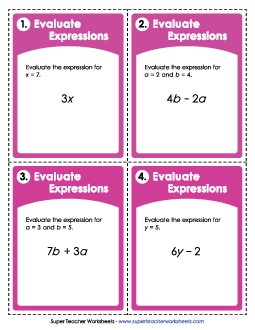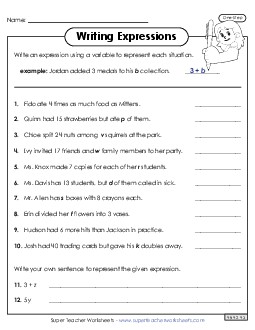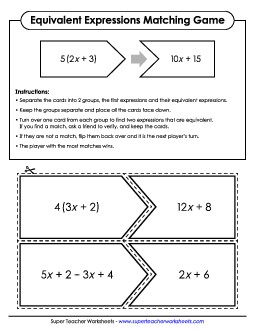Pre-Algebra and Algebra Worksheets

Here you'll find a variety of worksheets on which students will practice evaluating algebraic expressions with variables.
Writing Algebraic ExpressionsDownload and print worksheets on writing algebraic expressions.
(Example: Seven less than x is x-7)
On these printables, students will simplify algebraic expressions by combining like terms.
Algebraic Equations (Basic; One-Step)Solve single-step algebraic equations. This page has task cards and worksheets.
Algebraic Equations (Two-Step)With these printables, students can review solving more complex, two-step equations.
Inequalities (Basic; Single Variable; No Steps)These are very basic inequality worksheets. Students do not need to use any steps to isolate the variable. They simply practice graphing the inequality on a number line.
Inequalities (One-Step)Students will use one step to isolate the variable, then graph the inequalities.
Inequalities (Two-Step)Students can solve these inequalities in two steps.
Dependent and Independent VariablesUse these worksheets to help students differentiate between dependent and independent variables.
SlopeOn these worksheets students will find and graph the slope of a line.
Positive and Negative IntegersCount and perform basic operations with positive and negative integers.



Pre-algebra and algebra are fundamental math topics introduced in upper elementary and middle school, typically starting in fifth or sixth grade and continuing through eighth grade. These topics help students transition from basic arithmetic to more abstract mathematical thinking. Pre-algebra introduces students to foundational concepts such as variables, order of operations, and basic equations, while algebra builds on these skills by teaching students to work with algebraic expressions, solve multi-step equations, and explore functions. Understanding, reading, and writing algebraic expressions are key skills that students develop through hands-on classroom activities and practice.
In the classroom, students begin learning algebra through interactive activities like using manipulatives or drawing models to represent variables and equations. Teachers may start by introducing the concept of variables as unknown values represented by letters, and gradually students learn to combine like terms, simplify expressions, and solve equations. Group activities such as solving puzzles or playing math games focused on algebraic reasoning make learning engaging. Word problems that involve real-life scenarios also help students apply algebraic thinking to practical situations, deepening their understanding of how algebra can be used to solve everyday problems. As students progress, they explore more complex algebraic topics, such as linear equations, inequalities, and graphing.
The importance of understanding algebra cannot be overstated. Algebra serves as the foundation for higher-level math and many STEM (Science, Technology, Engineering, and Mathematics) subjects. By mastering the core concepts of algebra, students develop critical thinking, problem-solving, and logical reasoning skills that are essential for success in math and beyond. Algebra is also widely used in various real-world applications, from calculating interest rates to understanding patterns and trends in data. Building a strong foundation in algebra during the upper elementary and middle school years sets students up for future success in high school math courses and provides them with valuable tools for their academic and professional careers. Super Teacher Worksheets provides free helper worksheets and activities to help learn and practice algebra to get children a great head start.






